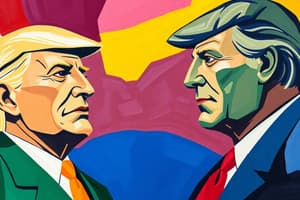Podcast
Questions and Answers
What best describes a hybrid regime?
What best describes a hybrid regime?
- A regime that is purely authoritarian without elections.
- A political regime where rights are strongly protected and governance is efficient.
- A regime that appears democratic but is manipulated to maintain elite power. (correct)
- A governmental system where all citizens participate directly in decision-making.
Which type of democracy focuses on the protection of individual rights alongside representation?
Which type of democracy focuses on the protection of individual rights alongside representation?
- Flawed democracy
- Liberal democracy (correct)
- Direct democracy
- Illiberal democracy
What is a key characteristic of an authoritarian regime?
What is a key characteristic of an authoritarian regime?
- Centralized political control and intolerance of opposition. (correct)
- Wide political pluralism and respect for civil liberties.
- High levels of participation from all citizens.
- Multiple political parties competing fairly in elections.
What is a definition of flawed democracy?
What is a definition of flawed democracy?
Which form of government limits the powers of the state in favor of individual rights?
Which form of government limits the powers of the state in favor of individual rights?
What distinguishes a codified constitution from an uncodified constitution?
What distinguishes a codified constitution from an uncodified constitution?
Which concept involves the distribution of power among different government institutions?
Which concept involves the distribution of power among different government institutions?
What is a defining feature of illiberal democracy?
What is a defining feature of illiberal democracy?
What best describes the concept of authority in governance?
What best describes the concept of authority in governance?
Which of the following is true about a nation?
Which of the following is true about a nation?
How does legitimacy differ from authority?
How does legitimacy differ from authority?
What characterizes a failing state?
What characterizes a failing state?
What is a characteristic of polyarchy?
What is a characteristic of polyarchy?
Which of the following best describes a de facto state?
Which of the following best describes a de facto state?
What is the main difference between a state and a nation?
What is the main difference between a state and a nation?
What defines a security state?
What defines a security state?
Flashcards
Governance
Governance
The process of making decisions, laws, and policies. Can happen with or without formal institutions.
Power
Power
The ability to get things done, or to make others do what you want.
Authority
Authority
The right to rule or exert control.
Legitimacy
Legitimacy
Signup and view all the flashcards
State
State
Signup and view all the flashcards
Nation
Nation
Signup and view all the flashcards
Microstate
Microstate
Signup and view all the flashcards
Quasi-state
Quasi-state
Signup and view all the flashcards
Direct Democracy
Direct Democracy
Signup and view all the flashcards
Full Democracy
Full Democracy
Signup and view all the flashcards
Flawed Democracy
Flawed Democracy
Signup and view all the flashcards
Democratization
Democratization
Signup and view all the flashcards
Authoritarian Regime
Authoritarian Regime
Signup and view all the flashcards
Hybrid Regime
Hybrid Regime
Signup and view all the flashcards
Representative Democracy
Representative Democracy
Signup and view all the flashcards
Liberal Democracy
Liberal Democracy
Signup and view all the flashcards
Study Notes
THEME 1: Government and Politics
- Governance: The process of making decisions, laws, and policies, with or without formal institutions.
- Power: The ability to achieve intended outcomes, often used synonymously with influence but also describes more forceful modes like coercion.
- Authority: The right to rule, which creates power when accepted by the people.
- Legitimacy: The condition of being rightful or justifiable; a legitimate government's authority is recognized by those subject to its rule.
THEME 2: States and Nations
- State: The legal and political authority within a defined territory, encompassing a population and marked by borders.
- Nation: A cultural and historical concept defining a group of people who share an identity based on history, culture, language, or myths.
- Microstates: Small states in terms of population and/or territory (e.g., Andorra, Barbados, Palau, Maldives).
- Quasi-states: States recognized under international law but whose governments have limited control over their territory.
- De facto states: States not recognized under international law but controlling territory and providing governance ("in fact").
- Multinational state: A state with multiple distinct national groups under a single government.
- Nationalism: A belief in the right of a group with a shared national identity to govern themselves, free from external interference.
- Security state: A state that actively monitors its citizens' activities.
- Failing state: A state with weak governing institutions, divisions, and unmet basic needs for its people (e.g., examples include Eritrea, Haiti, Somalia, Syria, and Yemen).
THEME 3: Democratic Rule
- Democracy: A political system where government authority comes from the people.
- Direct democracy: A system where every citizen participates in decision-making.
- Full democracy: A system with a strong democratic record, including open and effective governance and respected rights.
- Flawed democracy: A system that is predominantly democratic but faces issues in the quality of governance.
- Waves of democratization: Periods where societies develop institutions and processes to become democracies (e.g., first: 1828-1926; second: 1943-1962; third: 1974-1991).
- Authoritarian regime: A system where power is concentrated in a ruling elite, denying political diversity, opposition, and human rights.
- Hybrid regime: A system that exhibits some democratic features but also maintains autocratic characteristics, often controlling rulers or elite groups.
- Polyarchy: Rule by many, suggesting that not all individuals have equal power in a democracy.
- Representative democracy: A system where people elect individuals to represent their interests and make decisions.
THEME 4: Constitution and Courts
- Constitution: A written document (or collection of documents) that defines a state's government structure and citizens' rights as well as limits on government.
- Codified constitution: A constitution presented within a single document.
- Uncodified constitution: A constitution spread across multiple documents.
- Flexible constitution: A constitution easily amended through standard legislative processes.
- Rigid constitution: A constitution that requires extensive procedures for amendment.
- Eternity clause: A part of a constitution that cannot be amended or removed.
- Checks and balances: A system of shared power among government branches to prevent dominance by one.
- Liberal democracy: A system combining representation and constitutional protection of individuals' rights.
- Limited government: A belief that government powers should be restricted and specific guarantees should be established to limit their scope.
- Liberalism: A belief in the individual's worth and natural rights that must be protected from overreaching government.
- Illiberal democracy: Democracies that weaken citizen rights and civil liberties and curtail democratic processes.
Studying That Suits You
Use AI to generate personalized quizzes and flashcards to suit your learning preferences.




